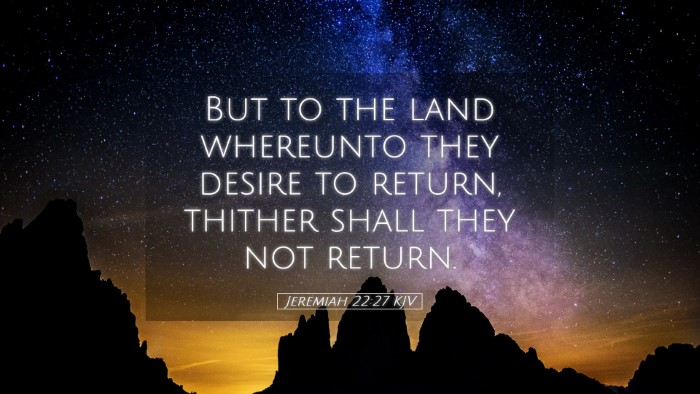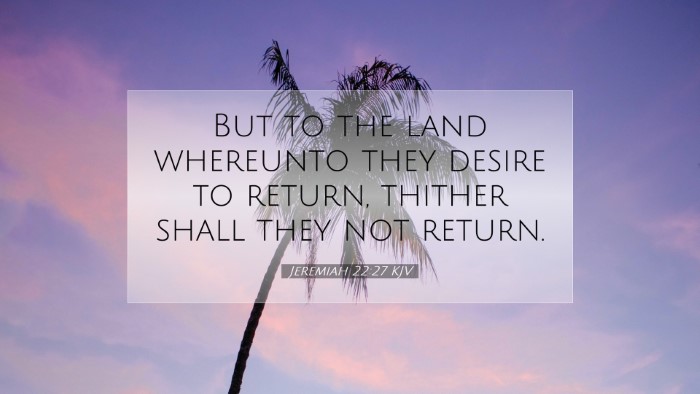Commentary on Jeremiah 22:27
Verse Context: Jeremiah 22:27 reads, "But to the land where they long to return, there they shall not return." This verse, found in the larger part of the prophetic messages of Jeremiah, serves as a poignant reminder of the consequences of disobedience and the certainty of God's will.
Understanding the Historical Context
In order to grasp the depth of this scripture, it is essential first to understand the historical backdrop against which Jeremiah prophesied. Jeremiah, known as the "weeping prophet," ministered during the tumultuous period leading up to and including the Babylonian exile. His prophecies, warnings, and lamentations encapsulate God's desire for His people to return to Him amidst their sins.
Commentary Insights
Matthew Henry's Perspective:
- Henry emphasizes the finality of judgment pronounced upon the disobedient. The denial of return to their land symbolizes not merely a geographical exile but a spiritual separation from God.
- He notes the irony that the people, who long for their homeland, would not be allowed to return, thereby displaying God's sovereignty over the nations and His capacity to fulfill His Word to both bless and judge.
Albert Barnes' Insights:
- Barnes explains the implications of the word "long" in this verse, indicating a deep, yearning expectation for restoration. However, God's decree effectively silences these hopes, declaring that what they crave will not be granted due to their rebellion.
- He also points out the prophetic nature of Jeremiah, indicating that the prophet’s words were not merely warnings but also a divine declaration of the covenant consequences for Israel's unfaithfulness.
Adam Clarke’s Commentary:
- Clarke shares that the passage reflects God's unwavering justice. By forbidding the return to their land, God illustrates that exile serves as both punishment and a means of refining His people.
- He highlights that the longing for home underscores a natural human experience. Still, Clarke points out that true restoration can only come through repentance and reconciliation with God.
Theological Reflections
This verse carries significant theological implications. First is the nature of God's judgment. Throughout the scriptures, one sees a balance between God's mercy and His justice. While He desires to gather His people, unrepentant sin leads to dire consequences.
Second, the concept of exile serves as a metaphor. For believers today, there may be spiritual exiles resulting from disobedience. The longing for spiritual homecoming must be coupled with genuine repentance to see restoration. This echoes the New Testament theme of repentance and reconciliation through Christ.
Practical Applications for Pastors and Theologians
- Emphasize Repentance: Pastors should remind their congregations of the importance of repentance. Like the Israelites, modern believers often face the consequences of disobedience. Encouraging a return to God’s ways can restore intimacy with Him.
- Teach Sovereignty and Justice: The sovereignty of God must be at the forefront of teaching. While God may seem distant, His plans are unfolding in the lives of His people according to His justice.
- Encourage Yearning for Restoration: Just as the exiles longed for home, believers today must cultivate a yearning for spiritual growth and intimacy with God. This longing can inspire deeper commitments to prayer and scripture study.
Conclusion
Jeremiah 22:27 serves as a powerful reminder of God's faithfulness to His Word. The insights gleaned from Matthew Henry, Albert Barnes, and Adam Clarke provide a rich tapestry of understanding regarding God's judgment and the importance of repentance. As pastors, students, and scholars engage with this text, let it lead to a deeper appreciation of God’s grace intertwined with the necessity of righteousness.


